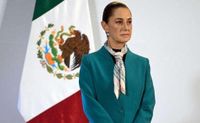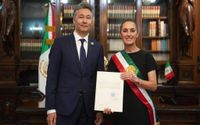In a bold declaration on March 22, 2025, the President of Mexico made clear that the nation's sovereignty is "non-negotiable" in light of the impending threat from the United States to impose a 25% tariff on Mexican products. This statement comes as a reaction to an announcement made by the US government on March 3, 2025, which stated that starting March 4, a 25% tariff would be levied on goods imported from Mexico and Canada.
Following the announcement, the President engaged in discussions with former US President Donald Trump and successfully negotiated a postponement of the tariff increase until April 2, 2025.
In further remarks, the President emphasized the need for Mexico to bolster its energy security and food supply to protect the sovereignty of the nation against external pressures. "Our government will enhance energy security and ensure food supply guarantees, as these are vital to protecting our nation's sovereignty," the President stated, framing the response as a proactive plan to strengthen the country's economic independence.
To implement these goals, the President announced the initiation of the "Mexico Plan," which aims to promote local production and stimulate domestic consumption. This strategy is designed to reduce dependency on foreign goods and bolster the domestic economy.
Adding to the diplomatic landscape, on March 23, 2025, the Ambassador of Kazakhstan presented his credentials to the President of Mexico during a ceremony held in the National Palace. The formal event saw the Ambassador convey warm regards from Kassym-Jomart Tokayev, the President of Kazakhstan, highlighting the importance Kazakhstan places on developing comprehensive cooperation with Mexico as a pivotal partner in Latin America.
During the credential presentation, the Ambassador noted, “Kazakhstan attaches great importance to developing comprehensive cooperation with Mexico,” underlining Kazakhstan’s commitment to strengthening ties with the Latin American nation.
The President of Mexico reciprocated the sentiment, expressing a clear desire to deepen collaboration with Kazakhstan across various sectors. “We desire to deepen cooperation with Kazakhstan,” he affirmed during the meeting, signaling a robust diplomatic engagement that transcends economic tensions with the incoming tariff from the US.
This dual focus on both local empowerment amidst international pressures and on fostering foreign partnerships illustrates the complex maneuvering of Mexican foreign policy in the current geopolitical climate.
The backdrop of these developments suggests that Mexico is actively evaluating its options in light of potential economic sanctions while looking to solidify alliances that may counterbalance existing pressures from more dominant economies.
The evolving relationship with Kazakhstan reflects a broader strategy that the Mexican government seems to be adopting: to seek reliable partners in global trade who can assist in diversifying Mexico’s economic channels outside of North America.
With tensions rising due to tariff threats, it remains to be seen how effective the "Mexico Plan" will be in mitigating dependence on the US, especially when economic pressures could take a toll on local production and economic growth. The President's insistence on sovereignty as a cornerstone of Mexico's identity signifies a strong patriotism that aims not only to protect economic interests but to reinforce a narrative of national pride amidst external challenges.
As both the domestic and international responses unfold in the coming weeks, the atmosphere surrounding these diplomatic and economic narratives will be crucial in understanding not just Mexico’s immediate tactical responses but its long-term strategic direction as well. With increasing collaboration with nations like Kazakhstan, Mexico appears focused not only on defending its sovereignty but also on embracing new opportunities for growth and partnership.





